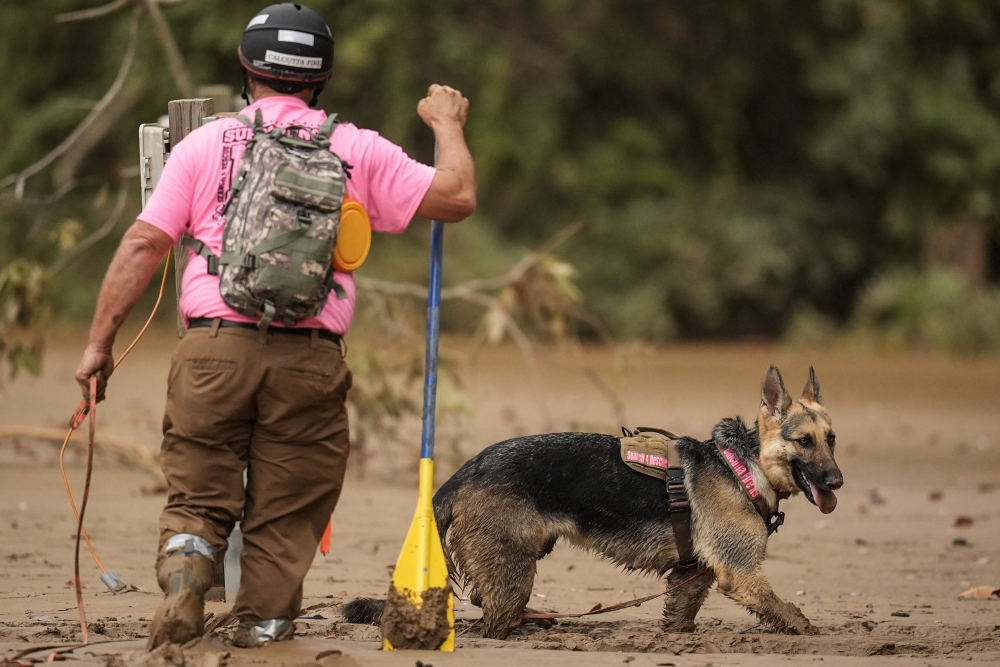I often say that at any point in time, we are easily three steps away from the apocalypse. Anticipating what can go wrong and making course corrections to prevent problems is an important part of animal rescue work. When I think of disasters, I always thought that my worst nightmare would be a fire in my shelter. That’s a plausible fear. Many of us live in old, dilapidated buildings with used or outdated equipment that are home to little furry lives 24 hours a day, every day of the year. This was our situation at the old shelter on Range Road before we moved to the new facility in Brunswick, and it is still the same at the Edgecombe Shelter. Sparks caused by faulty wiring and fires from old dryers have occurred in evacuation centers before, and could happen again. After Hurricane Helen, I realized that hurricanes are just as big a fire hazard as evacuation concerns.
I have friends, acquaintances, and former colleagues across the country who work in animal welfare. As many of us move across the country for our next professional step, social media makes it easy to stay in touch with each other. One such person for me is a former volunteer at my shelter in Washington, D.C., who ultimately chose shelter as a career field and landed at the Asheville Humane Society in North Carolina.
Watching the situation unfold in the South in the aftermath of Hurricane Helen is terrifying on many levels, but Rogers told us: You will always find someone who can help you. ” A friend of mine ended up in a shelter with his cat when the hurricane passed and has been staying there ever since. She is an incredibly positive person and says she received an amazing amount of help from the Bissell Pet Foundation to move her pet out of the shelter. The foundation flew these pets to nearby shelters with electricity and running water, inevitably making room for them in Asheville. Evacuated by hurricane. She considers herself lucky to have an apartment to return to, as the building is still standing, even if the electricity and water go out. But, she said, “so many things and communities are simply gone. They’re not damaged, they’re gone.”
One of our transportation partners, Diamonds in the Ruff, adopts dogs from Georgia shelters that cover Treutlen County. The roof of the shelter was torn off and the kennels were destroyed. Thankfully, they rescued all the pets before the storm, but where will the new pets that need their help go?
These are just two stories. There are many like them all over Florida, Georgia, Tennessee, and the Carolinas. The helpers are there. Animal welfare as a whole learned a lot from Hurricane Katrina about organized disaster response and the initial focus on moving animals from shelters in the affected area to the nearest shelter where they can be safely taken. I learned about the importance. Larger animal welfare organizations, such as the BISSELL Pet Foundation, ASPCA, Humane Society of the United States, and Best Friends, often arrange and fund these transportations, and organizations with disaster response teams are on the ground for rescues. Deploy boots. Once the nearest operational shelter is full, the group begins arranging transportation to more distant shelters. Because of their location, Maine animal shelters are often the least asked for help, but we are committed to our partners and waiting to see what we can do.
We will continue to do everything we can as an organization in the hope that our fellow shelters will help us if we find ourselves in a similar dire situation. . You can support them by adopting a pet currently in our care. This frees up space and allows us to take in more animals from areas in need. If you have a personal connection to Helen’s hard-hit areas, your local animal shelter will likely welcome your financial assistance. Corresponding national groups also need support to carry out their activities. It takes a lot of resources to finance flights, ground transportation, and deploy personnel to affected areas. Even if a natural disaster occurs far from home, there are still ways each of us can be a helping hand.
Jess Townsend is the Executive Director of Midcoast Humane.
Copy story link
Source link

